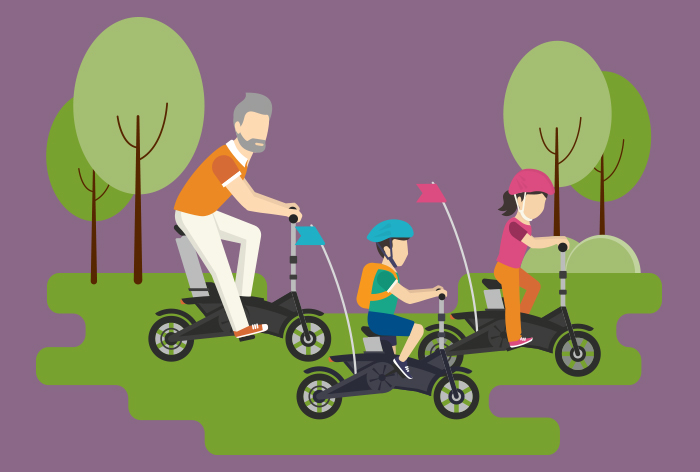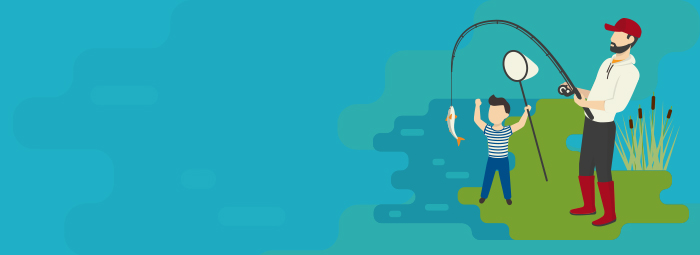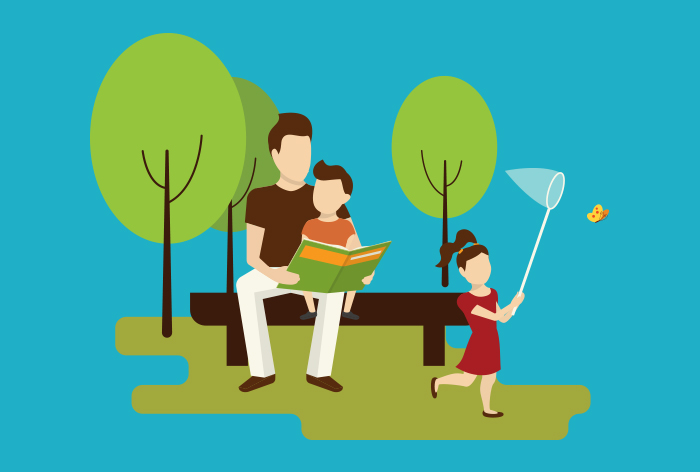5 local writers talk about fatherhood
Posted on June 16, 2016 at 6:00 am
By Erin Dodge
Today is the 8th Annual Engaging Fatherhood Conference & Resource Fair at Spokane Falls Community College (8am to 3pm), promoting the importance of fathers in healthy child development and family well-being. The event, including free lunch, is brought to the public by the DADS Committee of Spokane.
In celebration of dads, paternal bonds, and the influence of fathers in society, I asked local writers for their insights on fatherhood. Scott Eubanks, Samuel Ligon, Kenn Nesbitt, Shawn Vestal, and Frank Zafiro share their thoughts, from the serious to the whimsical. I hope they bring to mind the varied and influential fathers in the community who do so much for our children, especially as we celebrate Father’s Day this weekend.
What are the different challenges for fathers today compared to when you were growing up? Are there some that stay the same from generation to generation?
Scott Eubanks: When I was growing up, divorced fathers were expected to return to bachelorhood: to live in barren, filthy apartments filled with takeout containers, to complain about paying child support, to have the kids every other weekend, and of course, an inappropriately young girlfriend. Divorced parents were horrible to one another, using everything they could—including the kids—to inflict damage. It’s why it’s so traumatic for everyone involved.
I’m divorced with two kids. Today, a major challenge for me is navigating 50/50 joint custody in a way that maintains a consistent environment for healthy, happy kids. The keystone to that is maintaining a working relationship with their mother. Yeah, their mother and I are not together anymore, but being a grownup, I’ve learned that relationships aren’t like light switches. “I love you or you’re dead to me,” is fine for middle school drama, but exponentially destructive when you’re responsible for other people’s lives. Relationships are a spectrum. At one end, you have your soul mate, at the other, your arch nemesis or whatever. Just because the relationship didn’t work out, doesn’t mean you need to be screaming profanity in the driveway while the kids watch from the backseat (Start a savings account for therapy now). It isn’t easy, but you have to move a couple notches along the relationship spectrum from being married to being co-parents. You’re coworkers now. Your job is to your raise kids as best you can.
What stays the same from generation to generation is easy; we all want to raise kids that have the best chance at happiness. It’s the definition of happiness that changes.
Samuel Ligon: When I was growing up, children were given their first donkey at birth, then a goat at age 5, a pony at age 7, a second donkey at age 8, a third and fourth donkey at age 9, and circus animals (tiger, lion, elephant) at ages 10, 11, and 12, respectively. At age 13, all children were then sent to join the circus. It was hard in those days to have so many animals around the house and to always be preparing the children for their imminent circus lives, helping them decide so young if they were more likely to be trapeze artists or lion tamers, human cannon balls or clowns…and if clowns, what kind of clowns? Silly clowns? Sad clowns? Clowns with little dogs that would jump through rings of fire? It was a lot of pressure on kids and fathers both. It’s good that that pressure is gone. What’s more challenging today is how children hang around for so long, needing food and electricity for their devices, needing fatherly advice about school and dating and dropping out of college to become successful entrepreneurs. It’s nice that children become millionaires and/or billionaires today—that is different; some might say better. And while most children are no longer raised with circus animals, or face the struggle about which kind of clown to become (a keystone cop clown-car clown or a patches and bindlestiff hobo clown?) what never seems to change is the way fathers and children still struggle with the training of the family donkeys.
Kenn Nesbitt: One of the biggest changes for parents today, mothers and fathers alike, is the addition of the Internet and online culture to our lives. This has brought with it both challenges and benefits. It is a challenge keeping your children safe from dangers and age-inappropriate materials online, educating them about possible risks, and even making sure that they don’t spend too much time in front of a screen.
At the same time, though, the benefits have been tremendous. My teenage children are so much more knowledgeable and culturally literate than I was at their age, simply by virtue of not having to skateboard to the library every time they have a question.
Shawn Vestal: My sense is that fathers today, generally, are more involved in certain day-to-day aspects of parenting, more inclined to be hands-on and more expected to be hands-on. Of course, everyone is different. But the common image or stereotype of the fathers of my father’s generation—the bread-winner, the head of the household, the disciplinarian, and the one who might be sometimes aloof from domestic or emotional life—has given way to a different general image or stereotype today. Fathers do a lot of things they didn’t used to, and that’s good.
That said, I imagine that in many ways, the challenges remain the same, and what feels like the main, overarching challenge must be essentially the same: How to raise a good, decent, loving, contributing human beings. This is a different goal than having a perfectly behaved 8-year-old, or an academically successful junior high student, or a toddler that doesn’t annoy the other parents on airplane flights—all of these day-to-day challenges that we sometimes mistake for the most important ones.
Frank Zafiro: I think every generation has its own challenges when it comes to parenting. For me, I think the increased interconnectivity and greater shared knowledge that has developed for my youngest son’s generation is a challenge, particularly when it is coupled with the fact that the manner in which that connectivity occurs is usually virtual rather than actual. In other words, my kids have access to a tremendous amount of information and knowledge out there, so that’s good. But even though they probably connect with a lot more people than I did, those connections are less likely to be in-person, so some of those interpersonal skills are diminishing. That’s a new challenge. Of course, some challenges are the same—how much do you protect your child from the outside world without inhibiting his/her ability to survive and function in that same world?
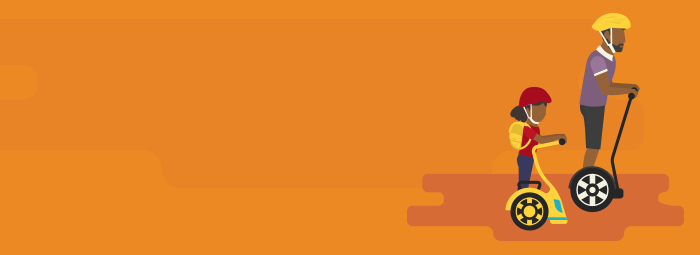
Have you found yourself surprised by saying or doing things your parents said or did with you? If so, what are your thoughts on that? If not, how is your approach to being a parent different?
Scott: When I’m with my kids, I usually default to how I was raised. I come from a big zoo of a family. My parents ran a foster home and ended up adopting five kids. For a couple months in the early ‘90s, there were seventeen people living in our house. Lots of noise, fighting, and yelling. My parents were just overwhelmed. When the kids started walking, I had to train myself to not yell from another room.
Now, when I’m finishing up after-dinner dishes and my daughter asks me to read with her, my default answer is, “I’m busy.” Right out of my parents’ playbook. But then I catch myself and realize that the house isn’t filled with children, that I only have a finite amount of time to spend with my kids and it goes by so fast. I dry my hands and tell her I’ll be there in a minute.
Samuel: My parents refused to use real language with me until I was a teen—so I didn’t know what anything was actually called until I was practically out of the house. What I’m saying is, my parents didn’t read or talk right to me. They made up sounds for words or just hummed circus music.
I didn’t do that with my kids. I read them books. Lots of them. And they knew what the word for “spoon” was and what the word for “moon” was and how to talk good, though I did still hum circus music to them when we groomed the donkeys or made peanut brittle, which oddly enough, we didn’t call peanut brittle—but glamour toxin.
Kenn: I try my best to be more thoughtful, considerate, and respectful of my children than my father was. I have no doubt that my father loved me, but I don’t know that he thought of respect as a two-way street. I believe that if you want your children to be able to respect others, they have to know what it feels like to be respected, and this begins with their parents. I think I only surprise myself when I don’t manage to live up to this standard, and instead say something thoughtless. Fortunately, I think we can also teach our children something valuable by acknowledging our mistakes and apologizing when we are wrong.
Shawn: In many ways, I’m raising my son differently than I was raised. I grew up in a religious home; we’re not religious. I grew up with lots of brothers and sisters; he’s an only child. But there is definitely the presence of that cycle of life in which we see ourselves and our lives echoing in our parents and children. I find myself trying to encourage my son to be less argumentative—just as my mother did with me. I find myself struggling, sometimes, to maintain my patience—just as I tested my parents’ patience. In looks and body movements and attitudes—echoes everywhere.
I think being a parent is profound for this reason—it awakens us to our own lives as part of a family continuum, a human relationship that echoes backward and forward in time, rather than as an expression of our pure individuality. This naturally deepens our understanding of, and love for, our parents.
Frank: I was raised mostly by my father, and I’ve certainly incorporated some of his ways in my own parenting. But we’re all individuals, so we find our own way, too. I think I noticed more of a difference between how I was with my oldest two and how I am with my youngest (he’s eight years younger than his sister).
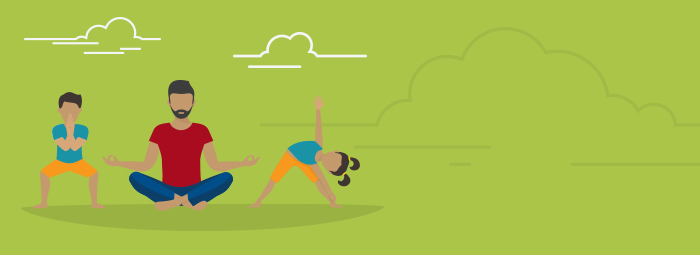
What books have spoken about or revealed universal truths of fatherhood? What were those truths?
Scott: To Kill a Mockingbird immediately comes to mind. Atticus Finch shows just how much empathy and bravery are required to be a good dad. I want to read Home Game: An Accidental Guide to Fatherhood by Michael Lewis. Michal Chabon has a nonfiction book, Manhood for Amateurs about fatherhood that’s pretty great.
Samuel: I think Pinocchio is one because of the donkeys and because of how wooden children aren’t as good as real live children. Live children are very, very good. That’s a universal truth. Wooden children are only good late at night when you still want to be asleep. Also, there’s a book called Lots of Dads, which my children loved, even though I was their only dad. So maybe it was more a universal lie revealed in that book. I would say King Lear was a pretty bad father, as was the dad in Hansel and Gretel. I think children are often very funny and are capable of seeing humor in sophisticated ways.
They’re also good at hearing the music in poetry and prose, which is why the Dr. Seuss books can be read over and over. Those books contain many universal truths about fatherhood, like: “It’s fun to have fun, but you have to know how.” Fathers should teach their children how to have fun, among many other things.
Kenn: The one universal truth that I learned from books and my own father is this: Fathers should read to their children. My father read books to me when I was young. Mother Goose. The Cat in the Hat. Go, Dog, Go. Ten Apples Up On Top. Are You My Mother? As a result, I learned to love reading, and eventually became a writer myself. The best way to get your kids to fall in love with books and become readers themselves is to read to them as much and as often as you can.
Shawn: I don’t know if it revealed much about fatherhood, necessarily, but the book that affected me most powerfully as a parent was Jane Smiley’s The Age of Grief, a novella. I read it in an MFA class at EWU, not long after we’d had our son, Cole, and this was that early-parenthood time of new pressures and joys, of feeling bound all around by a regime of responsibility and intimacy that I’d never experienced before. Smiley’s story is about a couple working through questions of fidelity and parenthood, and it is wrenching—but it is particularly wrenching in its handling of a child’s feverish illness and the parents’ desperate fear and desire to make the child well. That story made me deeply, deeply anxious—it really made me feel that the attachment and responsibility of this new relationship would be even more powerful than I had imagined.
Frank: I recall a passage from the Stephen King novel Christine, in which the protagonist, a high school senior, first recognized his father as an individual and not as a figure or a symbol. This speaks to the universal experience of “father as hero, father as human, father as sage” transition. I know that my oldest two have passed through this transition and certainly see me as an individual rather than a symbol. They’ve also realized that there is a resource of life wisdom available to them to help them on their journey now, just as I still sometimes turn to my own father.
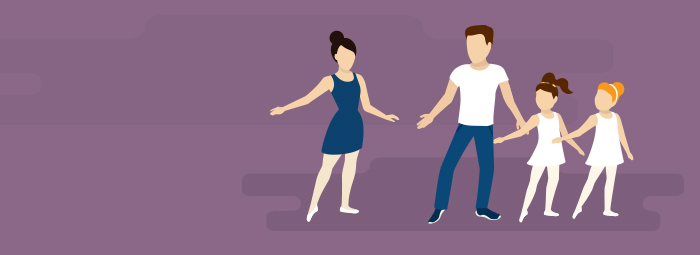
Would you share a story about how your child has surprised you?
Scott: When my daughter was four, she memorized every word of Beatrix Potter’s Peter Rabbit (we read it almost every night for months) and tried fooling me into thinking that she could read. She sat on her bed, the book in her lap, solemnly reciting each word.
Samuel: My children have surprised me since the moment they were born by just about everything they’ve done. I was particularly surprised that even though I used English words with them, they both first spoke Dutch. And even though I tried to make them pursue stimulating careers as billionaires, they so far seem more interested in other pursuits. My children were always readers, always curious, always good people. I’m surprised that their love for donkeys exceeds even my own.
Kenn: My kids surprise me most when they know something about the world (learned from the Internet, usually) that I don’t, or something I wouldn’t expect them to know. The most recent example that comes to mind was a couple of months ago. My wife and I had returned from a trip to Thailand and were telling the kids about a “wat” we had visited. I explained that “wat” was the Thai word for “temple.” My son turned to his sister and said, “Like Angkor Wat.” I asked him how he knew about Angkor Wat, since I assume most teenagers aren’t aware of even the most famous of Cambodian Buddhist temples. He replied, “It’s in Sid Meier’s Civilization V” (a video game).
Shawn: I am continually amazed at how much my son understands, compared to how much I think he understands. He’s always way ahead of me—whatever the circumstance, whether it’s his understanding of math, his ability to be kind (or sometimes cruel) to someone else, or his rapidly improving basketball skills.
When he was five, he asked me some questions one night about death and God and religion—questions that I had in no way expected from him yet. It was a really great conversation. We were laying side by side in his bedroom, with the lights off and these glow-in-the-dark stars glowing on his ceiling, and I told him I don’t know what happens after we die, but I don’t think anything does and other people believe other things. He said he didn’t want to die, and I said I didn’t, either, but luckily we would both live a lot longer, and he said, “Yeah, especially me.”
Frank: Seeing my daughter transform from a teenager with all the requisite angst into a smart, responsible woman wasn’t necessarily a surprise, but it has been a joyful experience. My oldest son telling me a few weeks ago that he’s going to become a father himself certainly qualifies as a surprise! We were getting tacos for lunch and he just blurted it out. And my youngest son (he’s 15) periodically surprises me when he demonstrates that he’s actually been listening to the lessons I try to teach him when the opportunity arises. You go years thinking your kids don’t hear a word you say, and then you finally realize that, yeah, they are paying attention. They are getting it. And that might be the biggest surprise of all!
About the writers…
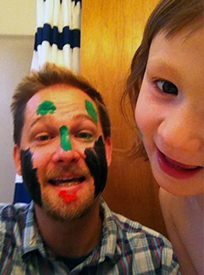 Scott Eubanks is a technical writer, father of two, and a terrible guitar player. His essays and short stories have appeared in Memoir (and), Whitefish Review, and Zone 3.
Scott Eubanks is a technical writer, father of two, and a terrible guitar player. His essays and short stories have appeared in Memoir (and), Whitefish Review, and Zone 3.
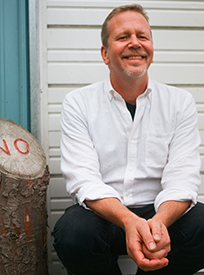 Samuel Ligon is the author of two novels—Among the Dead and Dreaming and Safe in Heaven Dead—and two collections of stories, Wonderland, illustrated by Stephen Knezovich, and Drift and Swerve. He edits the journal Willow Springs, teaches at Eastern Washington University in Spokane, and is the artistic director of the Port Townsend Writers’ Conference.
Samuel Ligon is the author of two novels—Among the Dead and Dreaming and Safe in Heaven Dead—and two collections of stories, Wonderland, illustrated by Stephen Knezovich, and Drift and Swerve. He edits the journal Willow Springs, teaches at Eastern Washington University in Spokane, and is the artistic director of the Port Townsend Writers’ Conference.
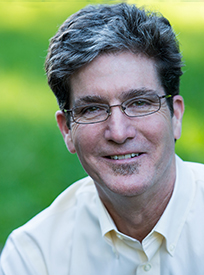 Kenn Nesbitt, former Children’s Poet Laureate (2013-15), is the author of many books for kids, including Kiss, Kiss Good Night, My Hippo Has the Hiccups, Revenge of the Lunch Ladies, and many others. His poems have appeared in the popular Kids Pick the Funniest Poems series and other anthologies, with nearly two million copies in print. Kenn travels the country, visiting over 60 schools each year, sharing his wacky brand of poetry with kids nationwide, and helping to create a new generation of poetry lovers. His website, poetry4kids.com, is the most visited children’s poetry website.
Kenn Nesbitt, former Children’s Poet Laureate (2013-15), is the author of many books for kids, including Kiss, Kiss Good Night, My Hippo Has the Hiccups, Revenge of the Lunch Ladies, and many others. His poems have appeared in the popular Kids Pick the Funniest Poems series and other anthologies, with nearly two million copies in print. Kenn travels the country, visiting over 60 schools each year, sharing his wacky brand of poetry with kids nationwide, and helping to create a new generation of poetry lovers. His website, poetry4kids.com, is the most visited children’s poetry website.
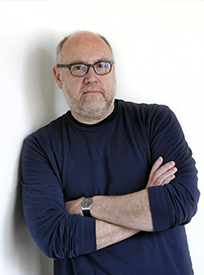 Shawn Vestal is the author of the novel, Daredevils, and a collection of short stories, Godforsaken Idaho, winner of the PEN/Robert W. Bingham Prize. He also published A.K.A. Charles Abbott, a short memoir, as a Kindle Single. His stories have appeared in Tin House, McSweeney’s, Ecotone, The Southern Review, Cutbank, Sou’wester, Florida Review and others. He writes a column for The Spokesman-Review in Spokane, Wash., and teaches in the MFA program at Eastern Washington University.
Shawn Vestal is the author of the novel, Daredevils, and a collection of short stories, Godforsaken Idaho, winner of the PEN/Robert W. Bingham Prize. He also published A.K.A. Charles Abbott, a short memoir, as a Kindle Single. His stories have appeared in Tin House, McSweeney’s, Ecotone, The Southern Review, Cutbank, Sou’wester, Florida Review and others. He writes a column for The Spokesman-Review in Spokane, Wash., and teaches in the MFA program at Eastern Washington University.
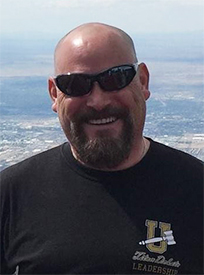 Frank Zafiro is the crime fiction pen name for Frank Scalise. Frank served as a police officer in Spokane for twenty years, retiring in 2013 as a captain. He has written numerous novels, as well as non-fiction. In addition to writing, Frank teaches leadership to police agencies across North America. He currently lives in Chattaroy with his wife and youngest son. His latest novel, The Short List, will be released on August 1.
Frank Zafiro is the crime fiction pen name for Frank Scalise. Frank served as a police officer in Spokane for twenty years, retiring in 2013 as a captain. He has written numerous novels, as well as non-fiction. In addition to writing, Frank teaches leadership to police agencies across North America. He currently lives in Chattaroy with his wife and youngest son. His latest novel, The Short List, will be released on August 1.
Tags: fatherhood, fathers, local, local authors, parenting, writers

